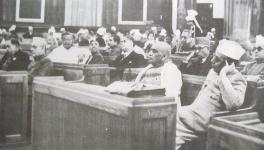With the decline of western courts’ progressive jurisprudence, the liberal judges outside the West might increasingly take resort to subaltern and indigenous literature to justify their opinions.
—–
After the U.S. Supreme Court recently overturned its Roe versus Wade (1973) judgement, some experts have opined that “in the months and years to come, the reversal of Roe may be cited as grounds for retrogression in the jurisprudence of other countries globally” and the “[U.S.] Supreme Court decision could have consequences globally”.
While I will not specifically comment on the impact of Dobbs versus Jackson (2022), in the larger context of the rising ascendency of constitutional conservatism in the West, I seek to explore the relationship between the progressive judgements of the western courts in the past and their ability to influence the decisions of constitutional courts outside the West.
Two questions that I seek to answer are: first, how receptive were the constitutional courts, outside the west, towards the progressive jurisprudence of western courts thus far?, and second, whether the ascendancy of constitutional conservatism in the West would be able to impact the judicial application of foreign laws in the future?
To answer these questions, I will look for evidence in the constitutional court of South Africa, Singapore and India.
South Africa
South African-American legal academic Heinz Klug’s has written that despite Section 39(1)(b) of the South Africa’s 1996 Constitution stating that courts “must consider international law” while interpreting the Bill of Rights, the Constitutional Court of South Africa, in Coetzee versus Government of the Republic of South Africa (1995), stated that the international experience is to be taken into consideration “with a view to finding principles rather than extracting rigid formulae”, and with the purpose of seeking “rationales rather than rules.”
In Sanderson versus Attorney-General, Eastern Cape (1997), the same court observed that:
“Comparative research is generally valuable, and is all the more so when dealing with problems new to our jurisprudence but well developed in mature constitutional democracies … Nevertheless, the use of foreign precedent requires circumspection and acknowledgement that transplants require careful management.”
It led to Klug drawing an inference that:
“Instead of relying on the international and foreign materials in the sense of legal precedent, the Court used these materials primarily as a means to distinguish the South African case … the Court tended to use the international and comparative materials as a source for specific lines of argument and justification and in a more general sense as a source for supporting the general role of the court, and judicial review in particular”.
Further, with respect to the use of foreign precedents in non-Bill of Rights cases, Klug made an inference that “the Constitutional Court has been quick to point to differences in constitutional language and structure, as well as history and culture as reasons for the Court to be fairly circumspect”.
The Constitutional Court of South Africa has stated that the international experience is to be taken into consideration “with a view to finding principles rather than extracting rigid formulae”, and with the purpose of seeking “rationales rather than rules.”
Thus, in the context of constitutional interpretation in South Africa, the progressive jurisprudence of the western courts has seemingly not been very effective in influencing judicial outcomes there.
Also read: Botswana High Court decriminalises homosexuality; cites India’s Navtej Johar
Singapore
Legal academic Arun K. Thiruvengadam’s book chapter titled The Continuing Resistance to Foreign Law in Constitutional Adjudication in Singapore (2016) which examined the use of foreign law by the Chief Justice of Singapore Sundaresh Menon’s Supreme Court of Singapore, argued that the manner in which the judges in Singapore related to the citation of foreign authorities can be categorised as “resistance” rather than “engagement”.
In the landmark case of Lim Meng Suang versus Attorney General (2014) adjudicated by the Court of Appeal of Singapore, Justice Quentin Loh observed that:
“First and foremost, Singapore is an independent nation with its own unique history, geography, society and economy. What is adopted in other parts of the world may not be suitable for adoption in Singapore. Second, postulating examples of how the world is changing without more is unhelpful as such examples can be countered by examples of areas where there are shifts in the opposite direction.”
On a similar note, Justice Andrew Phang Boon Leong observed that:
“Foreign cases that have conferred an expansive constitutional right to life and liberty should be approached with circumspection because they were decided in the context of their unique social, political and legal circumstances.”
Singaporean legal academic Jack Tsen-Ta Lee has written that prior to Chief Justice Menon taking charge in 2012, “during the tenure of Chief Justice Wee [Chong Jin] (1963-1990), a fairly cautious approach towards the application of foreign law was on display. During the tenure of Chief Justice Yong [Pung How] (1990-2006), the courts increasingly resisted applying foreign precedent.” Lastly, during the tenure of Chief Justice Chan Sek Keong (2006-2012), “there was a departure from the tendency…to dismiss foreign cases on superficial grounds, and that the Chan Court typically advanced substantive reasons for rejecting foreign law.”
The manner in which the judges in Singapore related to the citation of foreign authorities can be categorised as “resistance” rather than “engagement”.
The bottom line is that the Singaporean Supreme Court has, by and large, resisted the application of foreign precedents.
Thus, in the context of constitutional interpretation in Singapore, the progressive jurisprudence of the western courts was not very effective in influencing judicial outcomes.
Also read: Singapore High Court rejects the challenge to Section 377A
India
Northern Irish lawyer Christopher McCrudden’s noted that the Indian judiciary has been generally open to foreign precedents. It can be witnessed in several landmark judgements like Justice K.S. Puttaswamy (Retd.) versus Union of India (2017), Shreya Singhal versus Union of India (2015), Bachan Singh versus Union of India (1980), Maneka Gandhi versus Union of India (1978), and Bennett Coleman & Co. versus Union of India (1972), among others.
According to McCrudden, one reason for the open nature of the Indian judiciary towards foreign law was that: “…where the constitution is perceived as transformative, then it is more likely (as has proven the case in India) that foreign experience will be drawn on as examples of how such transformation is possible on particular issues.”
However, lawyer Chintan Chandrachud’s has, in a book chapter on constitutional interpretation, asserted that:
“A rhetorical tool that judges often rely upon is to argue that all interpretive approaches point to the same conclusion. This kind of argument is meant to satisfy all interpretive camps, through the Court’s refusal to unreservedly align itself with any of them (or conversely, its willingness to express limited support for all of them).”
The Supreme Court of India generally takes foreign law and experience into consideration to justify the conclusion arrived at by it, but the ultimate ruling is based on domestic laws and experience.
Therefore, an inference could be drawn that the Supreme Court of India generally takes foreign law and experience into consideration to justify the conclusion arrived at by it, but the ultimate ruling is based on domestic laws and experience. For example, in Navtej Singh Johar versus Union of India (2018), the Supreme Court took the Yogyakarta principles into consideration but decided the case based on constitutional law.
Also read: Transformative Constitutionalism- A post-colonial experiment
Thus, in the context of constitutional interpretation in India, while the progressive jurisprudence of the western courts was used to buttress the justification for the decisions arrived at, it did not per se determine the judicial outcome.
At this juncture, it is also important for me to state that since my analysis is neither empirical (jurisdiction-wise) nor exhaustive (globally), the only inference that I wish to draw is this: the ability of the progressive jurisprudence of western courts to influence the constitutional courts outside the West, regardless of the U-turn recently taken by western courts, is suspect because the evidence shows that it has not been able to decisively influence the outcomes.
Judicial application of foreign laws
To answer if the ascendancy of constitutional conservatism in the West would be able to impact the judicial application of foreign law outside the West in the future, two things have to be taken into consideration:
Firstly, based on the above-mentioned evidence from multiple jurisdictions, inferences can be drawn that the borrowing and application of doctrines from foreign law itself is something that is largely resisted by the Constitutional Courts; but when applied, it was applied only as a persuasive source or to supplement the justification of already formed judicial opinion on the subject-matter at hand.
However, this phenomenon is not limited only to judicial engagement with foreign law. The broader inference that could be drawn from the works of American legal academic M.V. Tushnet, Klug, Thiruvengadam, and Chandrachud is that courts first form an opinion and then use a particular legal doctrine as a smokescreen to justify their opinion on the subject-matter. This is reflected in their inconsistent or selective application of established doctrines.
Secondly, both Canadian political scientist Ran Hirschl as well as Thiruvengadam emphasised upon the political dimension to the judicial application of foreign law. While Hirschl stated that the “voluntary reference to foreign precedents is at least as much a political phenomenon as it is a juridical one”, Thiruvengadam wrote that, “it is often the political choices of judges that help explain some of their legal choices, especially in relation to whether and which comparative law to engage with”.
It is not the ascendency of constitutional conservatism in judicial thinking in the West but rather the ascendency of political conservatism in their domestic jurisdictions that is likely to impact the judicial application of foreign jurisprudence in the future.
On a similar note, American political scientist and jurist Alec Stone Sweet has asserted that constitutional law is political law, and “[c]onstitutional judges can contribute to the building of practices related to higher law constitutionalism, but there are limits to what they can do if they find themselves continuously in opposition to powerful elites, institutions, and cultural biases in the citizenry”.
Also read: What is the role of constitutional courts in a public health crisis?
Therefore, since the judicial application of foreign law is, seemingly, a political exercise, it is not the ascendency of constitutional conservatism in judicial thinking in the West but rather the ascendency of political conservatism in their domestic jurisdictions that is likely to impact the judicial application of foreign jurisprudence in the future.
Lastly, I also wish to assert that with the decline of western courts’ progressive jurisprudence that is liberal in nature, the liberal judges outside the West might increasingly take resort to subaltern and indigenous literature to justify their opinions based on cultural reasons. For instance, Justice D.Y. Chandrachud’s opinion, in Navtej Singh Johar, has cited academic, activist and author Ruth Vanita and historian, gay rights activist, and translator Saleem Kidwai’s co-edited book ‘Same-Sex Love in India: Reading from Literature and History’ (2000) to derive the point that Section 377 (unnatural offences) of the Indian Penal Code was “a supposedly alien law” because writings spanning over more than 2,000 years of Indian literature demonstrate that same-sex love has flourished, evolved and been embraced in various forms since ancient times in India.
Hence, with the rise in constitutional conservatism in the west, we might even start witnessing an ascendency in the liberal judges of other jurisdictions engaging with subaltern/indigenous literature to justify their liberal stand, subject to the facts of the case at hand.
























